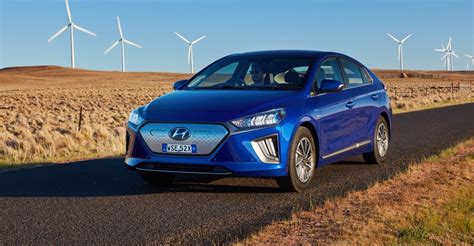The Hyundai Ioniq is a hybrid hatchback launched by Hyundai in 2017. It is a popular alternative to traditional gasoline-powered cars, offering a combination of fuel economy and performance. But as with any vehicle, there are pros and cons to consider when choosing the Ioniq. Here we look at some of the key benefits and drawbacks of the Hyundai Ioniq.
The Hyundai Ioniq has a few advantages. One is that it is relatively affordable, starting at around $23,000 for the base model. The Ioniq also has excellent fuel economy, with a range of up to 58 miles per gallon in combined city and highway driving. The Ioniq’s hybrid powertrain is also relatively quiet and smooth, and the hatchback design offers plenty of cargo space. The Ioniq has a roomy interior and boasts a suite of standard safety features, including blind spot monitoring and lane keeping assist.
The Ioniq also has some downsides. The hybrid powertrain can be a bit sluggish, and the Ioniq is not as powerful as some other hybrids on the market. The hatchback design also means that rear visibility is somewhat limited. In addition, the Ioniq does not offer some of the more advanced features found in some of its competitors, such as adaptive cruise control or semi-autonomous driving modes.
Overall, the Hyundai Ioniq is a solid hybrid option. It offers a combination of fuel economy, affordability, and safety features. It may not be as powerful or feature-rich as some other hybrids, but it is a great option for those who are looking for a reliable, efficient car.
Understanding The Benefits Of The Hyundai Ioniq
The Hyundai Ioniq is a popular car choice for many people, due to its affordability and impressive features. It is a hybrid car, meaning that it runs on both electric and gasoline, offering great fuel efficiency. Additionally, it is equipped with great safety features like automatic emergency braking and lane-keeping assist. But what are the pros and cons of owning a Hyundai Ioniq?
One of the main advantages of owning an Ioniq is its excellent fuel economy. The Ioniq offers a combined fuel rating of up to 58mpg and costs less than other hybrid cars. Plus, it runs more quietly than gasoline cars and produces fewer emissions, making it an eco-friendly choice. Additionally, the Ioniq has plenty of features to make your ride more comfortable, like Apple CarPlay and Android Auto.
On the flip side, one of the downsides of owning a Hyundai Ioniq is its lack of power. Although the Ioniq is more powerful than most electric vehicles, it still falls short when compared to traditional gasoline cars. Additionally, the Ioniq does not have many features that other cars do, like a sunroof or heated seats. Furthermore, the Ioniq is not available in all states and its price can be prohibitive for some.
Overall, the Hyundai Ioniq is a great choice for those looking for an affordable, eco-friendly hybrid car. Its fuel efficiency and features make it a great option, despite its lack of power and limited features. Plus, its price is competitive and it is available in many states. Here is a helpful table to compare the Hyundai Ioniq to its competitors:
| Car | Fuel Rating | Price |
|---|---|---|
| Hyundai Ioniq | 58mpg | $23,200 |
| Toyota Prius | 54mpg | $24,325 |
| Honda Insight | 55mpg | $23,850 |
In conclusion, understanding the benefits of the Hyundai Ioniq can be helpful when considering purchasing a hybrid car. Its fuel efficiency, features, and price make it a great option, despite its lack of power and limited features.
Exploring The Drawbacks Of The Hyundai Ioniq
The Hyundai Ioniq is a popular electric vehicle that offers an impressive range and efficiency, as well as several other features. However, while the Ioniq offers many advantages, it also has some drawbacks that you should be aware of before making a purchase. In this article, we will explore the drawbacks of the Hyundai Ioniq.
One drawback of the Hyundai Ioniq is its price. The Ioniq is one of the most expensive electric vehicles on the market, with a starting price of around $33,000. This can be prohibitively expensive for many buyers, especially if they are not eligible for government incentives or tax breaks.
The battery size of the Ioniq is also limited. The Ioniq has a battery capacity of 38.3 kWh, which is one of the smallest batteries available in an electric vehicle. This means that the Ioniq has a relatively limited range and may not be suitable for long-distance travel.
The Ioniq also has a limited charging speed. The Ioniq has a maximum charging speed of 7.2 kW, which is much slower than many other electric vehicles. This means that it can take several hours to charge the Ioniq, making it less suitable for long-distance trips.
Another drawback of the Ioniq is its lack of driver assistance features. The Ioniq does not come with features like adaptive cruise control, lane keep assist, or automatic emergency braking, which can be found in many other electric vehicles. This means that the Ioniq may not offer the same level of safety as some of its competitors.
Finally, the Ioniq has a limited selection of exterior and interior options. The Ioniq is only offered in two trim levels, and there are only a few options for colors and interior features. This can make it difficult to customize the Ioniq to your exact tastes.
The Hyundai Ioniq offers an impressive range and efficiency, as well as several other features. However, there are some drawbacks that you should consider before making a purchase. These include an expensive price tag, limited battery size, slow charging speed, lack of driver assistance features, and limited exterior and interior customization options.
The Hyundai Ioniq offers a variety of features such as heated front and rear seats, a 7-inch touchscreen display, wireless device charging, and a hands-free Smart Liftgate.
The Hyundai Ioniq has an EPA-estimated fuel economy of 57 mpg in the city and 59 mpg on the highway.
The Hyundai Ioniq is available in both hybrid and electric variants.
Owners of the Hyundai Ioniq can benefit from its efficient fuel economy, eco-friendly features, and advanced safety technology.
The drawbacks of the Hyundai Ioniq include a limited range in the electric model and a lack of acceleration power.
The Hyundai Ioniq is available in a variety of trim levels with prices starting at $23,200.
The Hyundai Ioniq comes with a 10-year/100,000-mile powertrain warranty and a 5-year/60,000-mile new vehicle limited warranty.
The Hyundai Ioniq offers a variety of safety features including blind spot detection, lane keeping assist, and adaptive cruise control.
The Hyundai Ioniq offers a user-friendly infotainment system with a 7-inch touchscreen display.
The Hyundai Ioniq is available with a 1.6-liter 4-cylinder engine and a permanent magnet synchronous electric motor.






